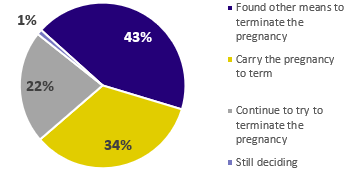Market Excel, a research company in India, generously made their panel available to Untold Research in order to conduct a survey on the impact of COVID-19. Immediately, Untold Research jumped at this opportunity to measure the impact COVID-19 has had on access to abortion and other vital reproductive health services as well as public opinion on expanding abortion access in India. Please note, due to the nature of panel research, the findings are not reflective of India’s entire population. However, it does provide a valuable snapshot into the need gaps and consequences of not being able to access abortion services as experienced by women in India.
In advance and support of International Safe Abortion Day, Untold Research is making this research available for free download here. Please feel free to use and share at will! If you have any questions about this research, please do not hesitate to reach out to Kate Vasiloff at kate@untoldresearch.com.
WIDE-SPREAD SUPPORT FOR THE RIGHT TO TERMINATE PREGNANCIES
In India, women not only support the right to terminate a pregnancy but exercise this right. Nearly nine in ten (85%) believe women should be allowed to decide when and whether she has a child and one in eight (13%) women in India have terminated a pregnancy. However, due to COVID-19, many women have not been able to access the services they so desperately need.
UNAVAILABLE CONTRACEPTIVES LEAD TO AN INCREASE IN UNWANTED PREGNANCIES
During COVID-19, roughly one in six women needed emergency contraception (16%) or regular contraception (15%) and even more needed to visit a health facility for a contraception-related need (19%) but were unable to obtain it. This lack of contraceptives resulted in more than two in five (44%) women engaging in sex without any contraception, yielding pregnancies in nearly as many women (38%), with another one in six (16%) still waiting to find out since pregnancy testing kits are also difficult to obtain (15%). Women in Delhi (61%) and Telangana (73%) and those with incomes of 30,001-40,000 rupees/month (47%) are much more likely to report pregnancies as a direct result of not having access to contraception than their peers across the country.
Given this high rate of pregnancies, one in ten Indian women (10%) have needed pregnancy termination services during COVID-19, with a majority (57%) being unable to secure such services. Debunking the common myth women wishing to terminate pregnancies are frequently young, uneducated, poor, and unwed, those seeking pregnancy termination during COVID-19 are most often between the ages of 30 and 39 (49%), married (66%), completers of graduate school (94%), living in households earning 40,001-75,000 rupees per month (48%), and residing in Maharashtra (28%)
COVID-19-RELATED BARRIERS TO PREGNANCY TERMINATION ACCESS
During “normal” conditions, terminating a pregnancy in India can be a challenge, be it lack of time or lack of money; adding restrictions to travel and an overburdened health care system only compound an already-grueling process.
Without access to pregnancy termination services during this time, have you found other means to end the pregnancy, decided to carry the pregnancy to term, still trying to terminate the pregnancy, or are you still undecided?
All other requirements being equal, do you agree or disagree the time frame in which women can receive an abortion should be increased from 20 weeks to 24 weeks?
Roughly one-quarter of women who wanted to terminate their pregnancy but were unable to do so cite physical restrictions, like police barricades (27%) or not being able to leave a containment zone (26%), closed (27%) or clogged (28%) health care facilities, or lack of transportation (25%), in large part due to the shut down of public transportation throughout India. Most often, women seeking a termination were told to get a COVID-19 test before seeking non-COVID-19-related health care (34%).
OUTCOMES OF UNWANTED PREGNANCIES DURING COVID-19
Of the aforementioned one in ten women (10%) seeking to terminate their unwanted pregnancy, two in five (43%) found other means to end the pregnancy which are often unsafe, such as inserting sticks and roots, ingesting herbal medicines, abdominal massage, or procedures performed under unhygienic conditions (Singh,2020), one-third (34%) are carrying the unwanted pregnancy to term, and one in five (22%) are still struggling to find a way to terminate the pregnancy.
Of the two in five (43%) women who were able to secure pregnancy terminations, two-thirds (68%) were able to obtain this service at a typical facility while one-third (32%) had to go to an alternative facility. Despite this added obstacle, a majority (61%) were able to terminate their pregnancy within three days, though one in five (19%) had to wait 10 or more days. In a country like India with strict conditions under which pregnancy terminations are legal, like being under 20 weeks, a 10-day delay could mean the difference between termination and being forced to carry an unwanted pregnancy.
SUPPORT FOR EXPANDING PREGNANCY TERMINATION RIGHTS
Under the current parameters (within the first 20 weeks of a pregnancy, with the approval of registered medical practitioners, and under specific circumstances, such as to save a woman’s life, to preserve a woman’s physical health, to preserve a woman’s mental health, in cases of rape or incest, and in cases of fetal impairment) four in five women (81%) believe “pregnancy termination should continue to be legal in India” and a majority (58%) believe the window of eligibility should be expanded from 20 weeks to 24 weeks. Support for this expansion spans the entirety of the country, from Delhi (69%) to Telangana (66%) to Tamil Nadu (65%), all age groups, and women at all income levels.
METHODOLOGY
Untold Research conducted this non-probabilistic online survey between July 3 and August 8, 2020, among 2,776 women ages 18-49 across India. Due to the limitations of the sample, respondents all have, at minimum, completed higher secondary school, belong to households earning at least 30,001 rupees, and likely live in urban areas. Therefore, when terms like “in India,” “throughout the country,” or “among women” are used, know this means within the universe of this survey and does not reflect a true representation of all women throughout the country.




